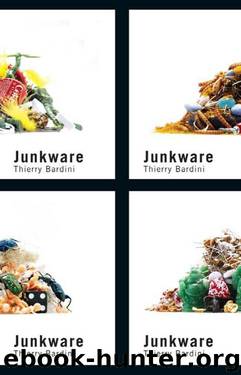Junkware by Thierry Bardini

Author:Thierry Bardini [Bardini, Thierry]
Language: eng
Format: epub
Tags: Philosophy, General, Movements, Humanism, Science, Philosophy & Social Aspects, Social Science, Anthropology, Technology & Engineering, Electronics, Digital
ISBN: 9780816667505
Google: 7hZDllG70OYC
Amazon: 0816667519
Publisher: U of Minnesota Press
Published: 2011-01-10T00:00:00+00:00
since Plato). In other words, anamnesis will bring back eternal ideas, closer to
God’s intellect, but not to his will. As long that you ascribe a drive (a will) to
power to God himself, you are bound to Gnosticism, and you need a demiurge.
There are, however, still two alternatives possible once you have made this
choice, and Erik Davis is right to notice that PKD is ambivalent at this level too:
Like the Gnostics of old, Dick flip-flopped between viewing the demiurge and his
archons as evil, or as aberrant and selfish products of their own ignorance and
power. The difference is crucial: the Manichaean notion that good and evil are
absolute principles sucks you into a harsh and rather paranoid dualism, while
the other, more “Valentinian” mode of gnosis opens into a continual transfor-
mation, an awakening that’s always on the fly. For the Valentinians of Alexan-
dria, the moment of transcendence is not an E-ticket out of here but a signal fed
back into the maze of the churning world. 10
This difference may be crucial, but both alternatives rest on the same prin-
ciple. Whether PKD hesitated between paranoid dualism or the possibility of
174
Chapter 6, Tail Again
anamnesis was well documented by his biographers, not to speak of his own
work. In the second case, however, by far the most profitable for his psyche
and the source of all his hope, the crucial point that Davis makes is that transcendence is fed back to immanence. If, as Erik Davis had it, PKD’s Gnosticism fed transcendence back in the immanent “churning world,” it means that glimpses
of God can be found in the creation of the evil demiurge. No one, I think, has
understood and expressed this idea better than Alexander Star, in a cover
essay for the New Republic:
Dick’s fallen worlds are not, to put it mildly, happy places. And yet they are at
least partially redeemed by fleeting glimpses of a hidden god. “Trash” and divin-
ity, Dick believed, were intimately linked. In an Exegesis entry, he wrote: “Premise: things are inside out . . . Therefore the right place to look for the almighty is,
e.g., in the trash in the alley.”. . . Carrying on a distinctly American visionary
tradition, Dick proposed that God preferred industrial waste to holy sanctuar-
ies. In its spiritualization of the coarse and the vulgar, Dick’s demotic Gnosti-
cism unexpectedly echoes Emerson, or Whitman, or even Melville. He sought a
kind of urban sublime, looking for shards of divinity in piles of junk. 11
Junk, then, appears as the only potential site to recover transcendence in
the iron prison that this world came to mean to Philip K. Dick. This character -
ization opens a new realm of hope, albeit, as always in his fiction, in an ambiva-
lent manner.
M Kipple
In the first released version of Blade Runner, the opening crawl situates the plot around the confrontation between “replicants,” quasi-perfect androids,
and “blade runners,” the bounty hunters in charge of “retiring” them:
Early in the 21st Century, THE TYRELL CORPORATION advanced Robot evo-
lution into the NEXUS phase—a being virtually identical to a human—known
as a Replicant. The NEXUS-6 Replicants were superior in
Download
This site does not store any files on its server. We only index and link to content provided by other sites. Please contact the content providers to delete copyright contents if any and email us, we'll remove relevant links or contents immediately.
| Deconstruction | Existentialism |
| Humanism | Phenomenology |
| Pragmatism | Rationalism |
| Structuralism | Transcendentalism |
| Utilitarianism |
The remains of the day by Kazuo Ishiguro(8943)
Tools of Titans by Timothy Ferriss(8345)
Giovanni's Room by James Baldwin(7293)
The Black Swan by Nassim Nicholas Taleb(7085)
Inner Engineering: A Yogi's Guide to Joy by Sadhguru(6775)
The Way of Zen by Alan W. Watts(6574)
Asking the Right Questions: A Guide to Critical Thinking by M. Neil Browne & Stuart M. Keeley(5734)
The Power of Now: A Guide to Spiritual Enlightenment by Eckhart Tolle(5718)
The Six Wives Of Henry VIII (WOMEN IN HISTORY) by Fraser Antonia(5482)
Astrophysics for People in a Hurry by Neil DeGrasse Tyson(5168)
Housekeeping by Marilynne Robinson(4418)
12 Rules for Life by Jordan B. Peterson(4291)
Double Down (Diary of a Wimpy Kid Book 11) by Jeff Kinney(4252)
The Ethical Slut by Janet W. Hardy(4232)
Skin in the Game by Nassim Nicholas Taleb(4223)
Ikigai by Héctor García & Francesc Miralles(4212)
The Art of Happiness by The Dalai Lama(4114)
Skin in the Game: Hidden Asymmetries in Daily Life by Nassim Nicholas Taleb(3972)
Walking by Henry David Thoreau(3937)
